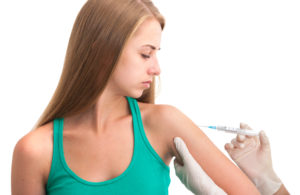I <3 Vaccines

I love vaccines. Now, don’t get me wrong; I don’t love getting “shots.” I think it would be hard to find anyone who enjoys getting poked with a needle. I think vaccines are pretty cool because of what they can do for people’s health. They aren’t a treatment for when someone is already feeling sick; they prevent illness from happening in the first place. Vaccines are used to prevent many diseases that used to be feared all over the world, and with them we’ve been able to wipe certain infections off the face of the Earth. Today, we even have vaccines available that can help prevent certain types of cancer.
No, your eyes are not deceiving you. I did just say that there are vaccines available to help prevent certain types of cancers. These vaccines are known by two different names—Gardasil and Cervarix. (Both do the same thing, just in slightly different ways. So you can get Gardasil or Cervarix, but don’t need to receive both. ) Their job is to prevent the body from being infected with the Human Papiloma Virus (HPV). This virus can cause cervical cancer, oropharyngeal cancer (cancers of the middle part of the throat), vaginal cancer, vulvar cancer, anal cancer, and penile cancers.
HPV is a common sexually transmitted infection (STI).
According to the CDC about 90% of sexually active men and 80% of sexually active women will be infected with HPV at some point in their lives. However, this does not mean that they are automatically going to get any of the types of cancers listed above. Most HPV infections occur with no symptoms, and may clear on their own. This is because there are different types of HPV, called strains, and just a few of these strains cause cancer. The problematic strains are the ones that the vaccine protects against.
Both boys and girls can benefit from the HPV vaccine.
It is true that most cancer caused by HPV is cancer of the cervix. (The cervix is part of the female reproductive tract, and so only women can get cervical cancer.) Yet, there are other cancers this virus can cause in both women and men. Certain strains of HPV cause genital warts, an STI that affects both guys and girls. By receiving the vaccine boys can also be protected against certain HPV infections before they become sexually ative. Also, if boys get the vaccine and have protection against the virus, they can help stop its spread!
Not only people who are having sex need to get the vaccine.
While sexual contact is the way almost everyone gets HPV, the very best time to get an HPV vaccine is actually before you even think about having sex! The vaccines are very effective at preventing new HPV infections, but they can’t treat an infection that already exists. This is why it is recommended that girls and boys get the vaccine at around ages 11 or 12. This way they are protected when and if they one day choose to become sexually active. However, if you are already sexually active and have not received the vaccine, don’t worry! Your window of opportunity is not closed forever. If you get the vaccine now, you can still protect yourself against possible future infections.
I don’t know if I’ve been able to convince you that vaccines are cool. But, if you find yourself wondering if you have had this vaccine, or are curious about learning more, ask your health care provider at your next visit. They will be able to tell you if you have, and discuss a way to get it if you and your HCP think it would be the right decision for you!
All information in this article comes from the National Cancer Institute. More information can be found on their website: http://www.cancer.gov/about-cancer/causes-prevention/risk/infectious-agents/hpv-vaccine-fact-sheet#q11
-Julia

